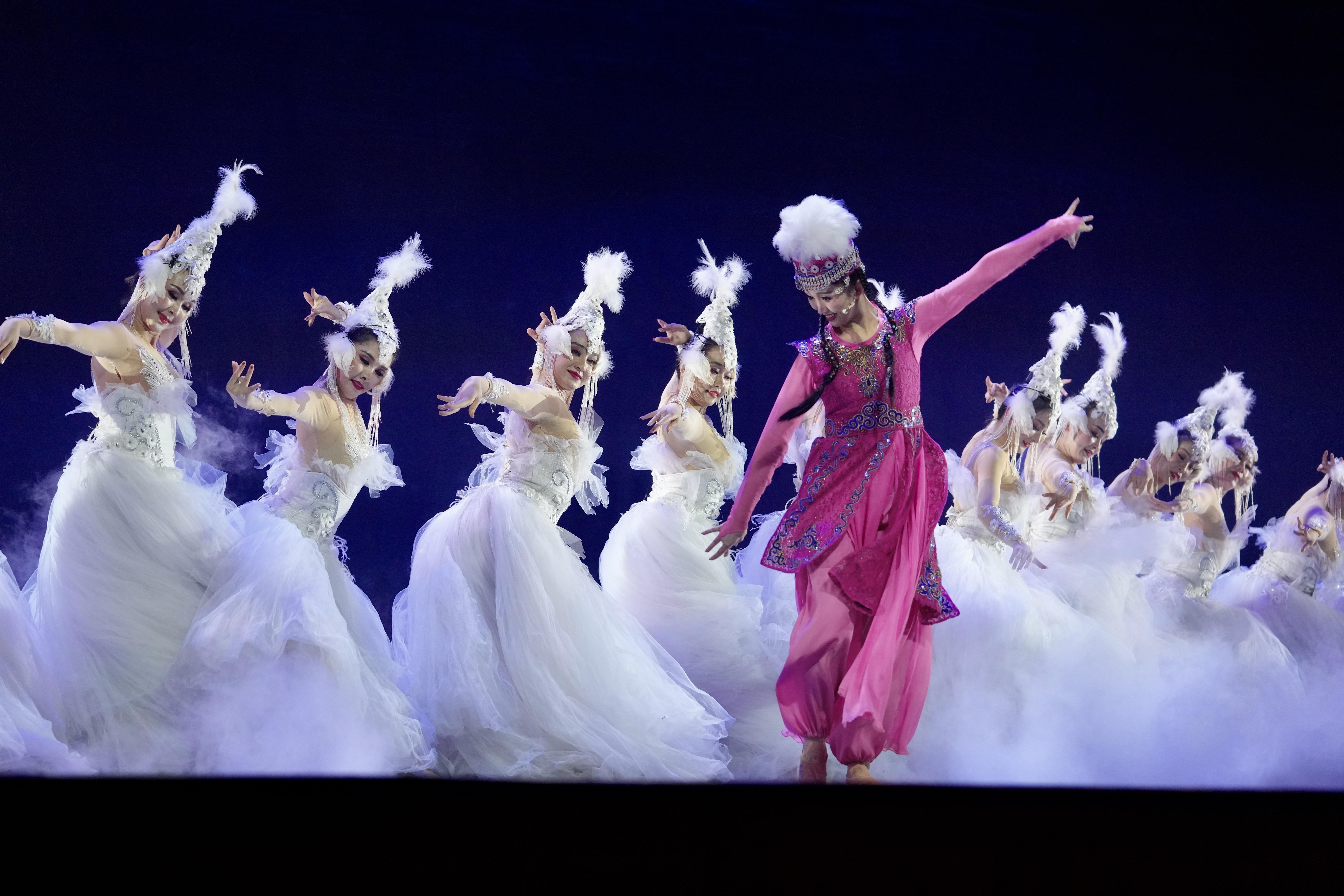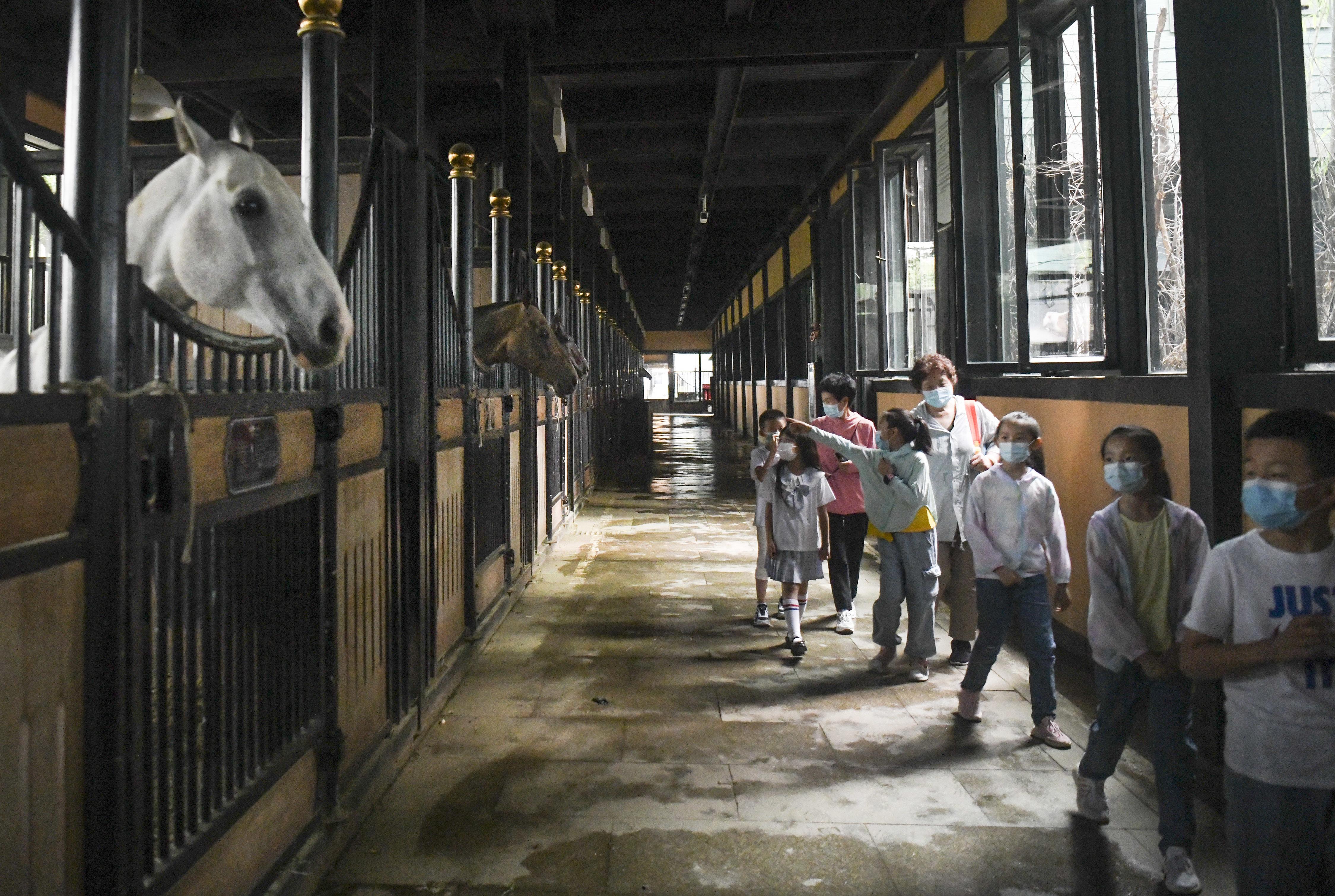President shares touching accounts of exchanges between peoples
 Dancers perform the Kirgiz epic Manas at the National Theater of the China Ethnic Song and Dance Ensemble on March 18 in Beijing. (PHOTO / XINHUA)
Dancers perform the Kirgiz epic Manas at the National Theater of the China Ethnic Song and Dance Ensemble on March 18 in Beijing. (PHOTO / XINHUA)
China and Central Asian countries, which began interactions through the ancient Silk Road more than 2,000 years ago, have enjoyed steady political and economic ties, as well as a tradition of friendly exchanges between their peoples.
President Xi Jinping, through his speeches, remarks and signed articles, has shared with the public the many touching stories of people-to-people exchanges between both sides. The following are accounts of the exchanges, and what later happened to some of the people.
1. Xian Xinghai Boulevard — from Xi's speech at Nazarbayev University in Astana, Kazakhstan, on Sept 7, 2013
The boulevard in the ancient city of Almaty, Kazakhstan, is named after Xian Xinghai, a renowned Chinese composer.
Xian traveled to Moscow in 1940 to score a documentary about the Eighth Route Army in Yan'an, Shaanxi province, the then revolutionary base of the Communist Party of China. But his work was interrupted in 1941, when the Great Patriotic War broke out.
Xian wanted to return to China, but his attempts were thwarted. Stricken by poverty and disease, Xian found his way to Almaty in 1942, where he met Kazakh composer Bakhitzhan Baykadamov.
Baykadamov took Xian in, let Xian stay at his sister's home and shared rationed food with the Chinese musician.
During his stay in Almaty, Xian composed the symphonies Liberation of the Nation, Sacred War, Red All over the River and Amangeldy, a piece created in honor of a Kazakh national hero.
In 1999, Almaty named a boulevard after Xian, and erected a monument to honor him to mark the friendship between the peoples of China and Kazakhstan.
2. Reunion after five decades — from Xi's speech at Nazarbayev University in Astana on Sept 7, 2013
Li Yuankang was born in the late 1940s to a Chinese man and a woman from the former Soviet Union.
His parents fell in love when they were working in what is today the Xinjiang Uygur autonomous region. They married and gave birth to Li and his elder sister.
Li and his family lived together in China until 1955, when Li's mother took his elder sister with her and returned to her home country.
Eager to see his mother again, Li tried every means possible to find her.
His efforts paid off in 2009, when they finally met. It turned out that his mother was living in Almaty, Kazakhstan. At the time, Li was 61 and his mother was 80.
"The happiness that came half a century late is a powerful witness to the friendliness between the peoples of China and Kazakhstan," Xi said.
 Primary school students visit in June 2022 the Xinjiang Ancient Ecological Park in Urumqi, Xinjiang Uygur autonomous region, which hosts the largest Akhal-Teke horse base in the country. The rare breed is native to Turkmenistan and the horses are known for their speed, endurance, intelligence and sleek coat. (PHOTO / XINHUA)
Primary school students visit in June 2022 the Xinjiang Ancient Ecological Park in Urumqi, Xinjiang Uygur autonomous region, which hosts the largest Akhal-Teke horse base in the country. The rare breed is native to Turkmenistan and the horses are known for their speed, endurance, intelligence and sleek coat. (PHOTO / XINHUA)
3. Rare blood donor — from Xi's speech at Nazarbayev University in Astana on Sept 7,2013
Since 2009, when he came to Hainan province to study, Ruslan Tulenov from Kazakhstan has been donating rare Rh-negative blood twice a year to save lives.
After graduating from Hainan University in 2015, Tulenov began studying for his master's degree in Beijing. He completed his postgraduate study in 2018. Having witnessed China grow by leaps and bounds over the years, he decided to find a job and remain in the country.
In 2019, Tulenov became the first foreign staff member of the Hainan Provincial Bureau of International Economic Development.
In April 2022, Tulenov had the opportunity to introduce his work to Xi during the president's visit to Hainan. Xi called Tulenov "an old China hand", and welcomed more global talent to come to Hainan.
4. Precious horse breed — from Xi's remarks at the International Akhal-Teke Horses Association Special Conference and China Horse Culture Festival on May 12, 2014, in Beijing
Akhal-Teke, a world-renowned fine horse breed, is native to and the pride of Turkmenistan. The horse has become a messenger of and witness to the lasting friendship between the peoples of the two countries.
Chinese people love Akhal-Tekes, which arrived in China along the ancient Silk Road more than 2,000 years ago.
Akhal-Teke is called hanxuema or hanxuebaoma in Chinese, which means "horse that sweats blood", and is valued for its metallic-looking coat, speed and endurance. In China, the horse was first recorded in Shiji, or the Historical Records, written by Chinese historian Sima Qian.
Since the two countries established diplomatic relations in 1992, Turkmenistan has sent several of the horses to China as state gifts.
5. Manas epic — from Xi's signed article published in Kyrgyzstan on June 11, 2019
In an article signed by Xi, published ahead of a state visit to Kyrgyzstan, the president mentioned an opera the China National Opera House was going to perform in Kyrgyzstan.
The opera, sung in Chinese, is based on the epic tale of Manas, a chieftain of the Kirgiz people.
The performance allows the cultural treasure shared by people in both China and Kyrgyzstan to shine brilliantly once again, and strikes a strong note on the traditional friendliness between the two countries, Xi wrote.
Listed as an intangible cultural heritage by UNESCO, Manas is a treasure of Kirgiz culture and one of the three major heroic epics of China's ethnic minority groups. Containing stories about Manas and his offspring, the epic is very popular in the Xinjiang Uygur autonomous region and some Central Asian countries, including Kyrgyzstan.
6. Foreigner, but not an outsider — from Xi's speech at the virtual summit commemorating the 30th anniversary of diplomatic relations between China and Central Asian countries on Jan 25, 2022
Ismail Daurov came from Kazakhstan to study in Xi'an, Shaanxi province, in 2013, and spent nine years in the city.
He was known for actively volunteering for the COVID-19 response in Xi'an at the end of 2021, when he was studying for his master's degree at the Shaanxi University of Chinese Medicine.
Daurov's words — "I am a foreigner, but I am not an outsider" — touched the hearts of many in China, Xi said.
Daurov, also known by his Chinese name Ma Wenxuan, gained his master's degree and now runs a clinic in Kazakhstan.
7. The ophthalmologist — from Xi's signed article published on the Kazakhstanskaya Pravda newspaper on Sept 13,2022
In the signed article published ahead of his state visit to Kazakhstan, Xi mentioned the story of Saulebek Kabilbekov, an ophthalmologist from Kazakhstan, to demonstrate the deep friendship between the peoples of China and Kazakhstan.
Kabilbekov, who went to Daqing Ophthalmology Hospital in 1998 to provide technical assistance at the invitation of the hospital, worked there for 24 years and treated nearly 200,000 Chinese patients.
A versatile expert, Kabilbekov was the first to conduct several types of eye surgeries, including posterior scleral reinforcement, in the city of Daqing, Heilongjiang province, according to the hospital.
Called "Doctor Bieke" by local people, Kabilbekov has traveled across the western regions of Heilongjiang, providing free diagnosis and treatment for farmers, giving lectures to other medical workers and promoting eye hygiene knowledge among students.


